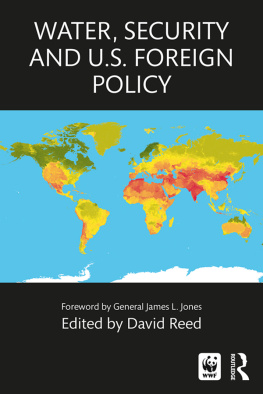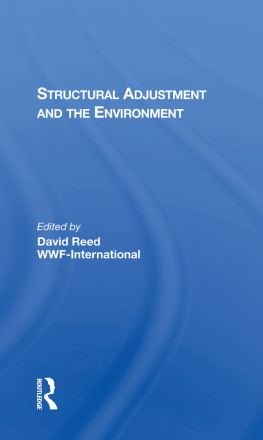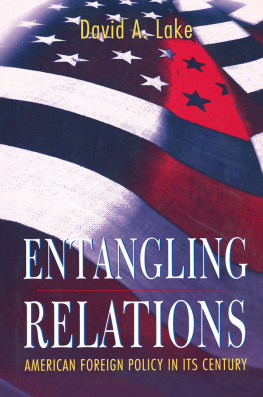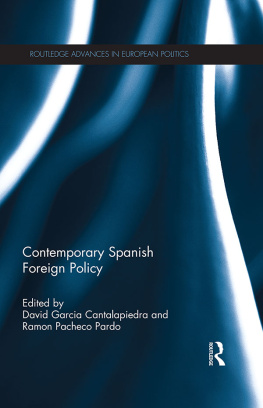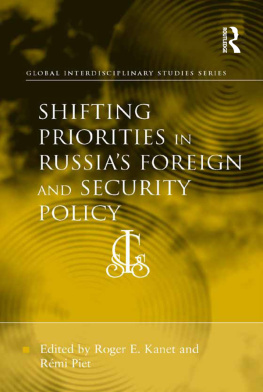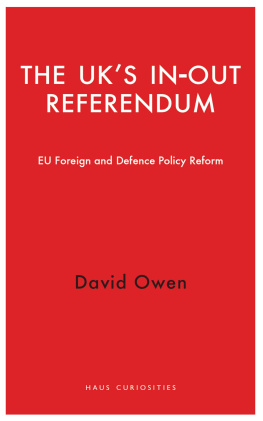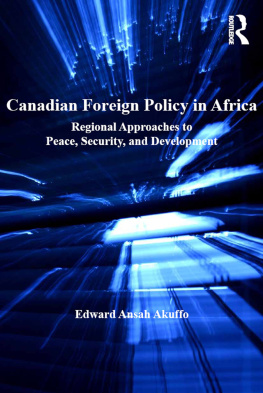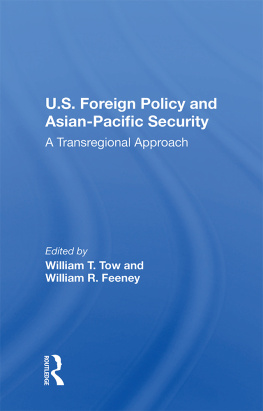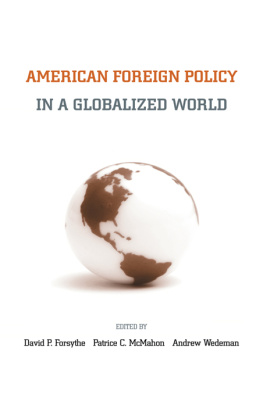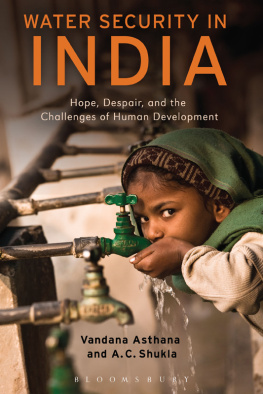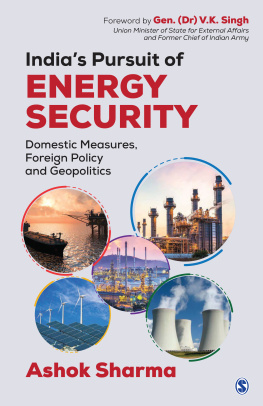This impressive volume brings together many of the worlds leading thinkers and practitioners on global water policy. The chapters survey the water and governance challenges in a number of important countries and regions. The contributors grapple with the complexity of how problems related to water potentially create security concerns for the United States and what, if anything, the U.S. government can do to help others and thereby help itself.
Joshua Busby, Associate Professor of Public Affairs at the University
of Texas at Austin and author of Water and U.S. National Security
(Council on Foreign Relations 2017)
Climate change has driven home what we should have known for a long time: water is the root of much of the worlds instability and conflict. And there is no one better than David Reed to apply his enormous experience across a score of regions. His careful book drives home a second truth we should have known: water is the problem but mismanagement is the curse. Accordingly, he provides a framework for a critical shift in policy, from providing water to managing watersheds, almost always involving more than one country.
Greg Treverton, former chair of the U.S. National
Intelligence Council
Water, Security and U.S. Foreign Policy
The prosperity and national security of the United States depend directly on the prosperity and stability of both partner and competing countries around the world. Today, U.S. interests are under rising pressure from water scarcity, extreme weather events and water-driven ecological change in key geographies of strategic interest to the U.S. Those water-driven stresses are undermining economic productivity, weakening governance systems and fraying social cohesion in scores of countries and, in the process, undermining the vitality of rural livelihoods, fostering local and ethnic conflicts, driving broad migratory movements and contributing to the growth of insurgencies and terrorist networks.
While the U.S. intelligence community has steadily expanded natural resource concerns in their global threat analyses, our overseas development assistance remains locked into provision of water and hygienic services rather than responding to the full sweep of global water challenges including governance and policy failures, growing conflicts over water and the need for promoting sustainable transboundary water arrangements in partner countries. A fundamental departure from the past is urgently needed.
Based on 18 case studies, Water, Security and U.S. Foreign Policy provides an analytical framework to help policy makers, scholars and researchers studying the intersection of U.S. foreign policy with the environment and sustainability issues, interpret the impacts of water-driven social disruptions on the stability of partner governments and U.S. interests abroad. The book also delivers specific recommendations to reorient U.S. development and diplomatic engagements that can forestall and prevent social disruptions and ensuing threats to U.S. prosperity and national security.
David Reed is Senior Policy Advisor for WWF-US.
Water, Security and U.S. Foreign Policy
Edited by David Reed
First published 2017
by Routledge
711 Third Avenue, New York, NY 10017
and by Routledge
2 Park Square, Milton Park, Abingdon, Oxon OX14 4RN
Routledge is an imprint of the Taylor & Francis Group, an informa business
2017 Taylor & Francis
The right of David Reed to be identified as the author of the editorial material, and of the authors for their individual chapters, has been asserted in accordance with sections 77 and 78 of the Copyright, Designs and Patents Act 1988.
All rights reserved. No part of this book may be reprinted or reproduced or utilised in any form or by any electronic, mechanical, or other means, now known or hereafter invented, including photocopying and recording, or in any information storage or retrieval system, without permission in writing from the publishers.
Trademark notice: Product or corporate names may be trademarks or registered trademarks, and are used only for identification and explanation without intent to infringe.
Library of Congress Cataloging-in-Publication Data
A catalog record for this book has been requested
ISBN: 978-1-138-05149-2 (hbk)
ISBN: 978-1-138-05151-5 (pbk)
ISBN: 978-1-315-16827-2 (ebk)
Typeset in Times New Roman
by Apex CoVantage, LLC
Contents
General James L. Jones
Part I
In Search of a Mission
DAVID REED
Part II
Water and Social Disruptions
DAVID REED
ERIKA WEINTHAL, FARAH F. HEGAZI, AND LESHA B. M. WITMER
HERMAN ROSA
ARIEL CUSCHNIR
ROMN GMEZ GONZLEZ COSO
EDUARDO STEIN WITH LILIAN MARQUEZ
MARCUS KING
PETER GLEICK
DAVID MICHEL
GLEN HEARNS
RICHARD KYLE PAISLEY
ALI HASNAIN SAYED, CHELSEA N. SPANGLER, AND MUHAMMAD FAIZAN USMAN
CECILIA TORTAJADA, UDISHA SAKLANI, AND ASIT K. BISWAS
KEITH SCHNEIDER
ARJUN THAPAN
ROGER-MARK DE SOUZA
Part III
Financing Water Infrastructure
E. PATRICK COADY
ALDO BAIETTI
WILLIAM STREETER
MARC JEULAND
Part IV
New Challenges, New Directions
DAVID REED
DAVID REED
David Reed and the World Wildlife Fund have turned an urgently needed spotlight on the future-defining issue of global water security. The report provides a powerful rationale for why addressing global water security must be central to the U.S. national security strategy and the shaping of our foreign policy.
During most of my military service, U.S. national security was defined by the long, twilight struggle against communism and the Soviet military threat. Security was expressed in the calculus of comparative troop strength, weapons count, and nuclear throw weight. Todays threats are exponentially more diverse and more complex than in earlier times. Whats clear is that modernity demands a far richer conception of national and international securityone less reliant on reaction and far more focused on anticipation and preventionone that centers on disarming the root causes and major multipliers of conflict and instability.
Viewed from that lens, what comes into sharp relief is that the premier strategic threat to global security is not a particular country, ideology, or weapon. Rather, it is failing to satisfy human needs and wants, especially for the basics including food, energy, water, and human dignity.
Today, water scarcity is dangerously weakening vulnerable societies, creating fragile states. Lack of access to resources, in particular water, whether caused by mismanagement or inequitable distribution, is a major driver of poverty, conflict, and extremism. As I write, 1.8 billion human beings have no access to clean water. The bulk of this population clings to life in the most unstable, violence-torn regions on Earth, where terrorist and insurgent enterprises are working to capture operating space and followers by leveraging human want and desperation to achieve a perverted form of legitimacy.
Water scarcitys role in creating fragile states and sharpening interstate conflict, in catalyzing disruptive mass migration, and in predisposing populations for exploitation and conflict is not some abstract, distant danger. It is happening now. Without question, water stress exacerbated by extreme weather events has contributed significantly to conflicts and instability across the Middle East and in Africa while fueling social conflict in the Northern Triangle in Central America, Iran, Pakistan, India, and other countries around the world. Resource scarcity and imbalance feed insurgency and help fuel groups such as Boko Haram, the Islamic State, the Taliban, and Abu Sayyaf. Conditions in the geographies where these malefactors operate will have enormous impact on the reach of global peace and development, as well as our own prosperity and security, in the decades to come.


